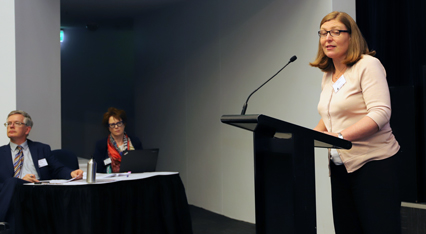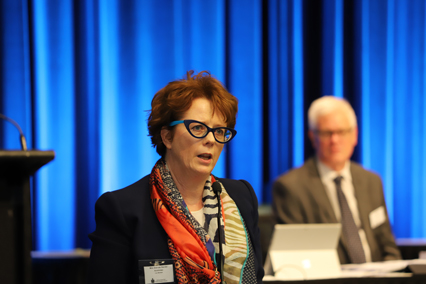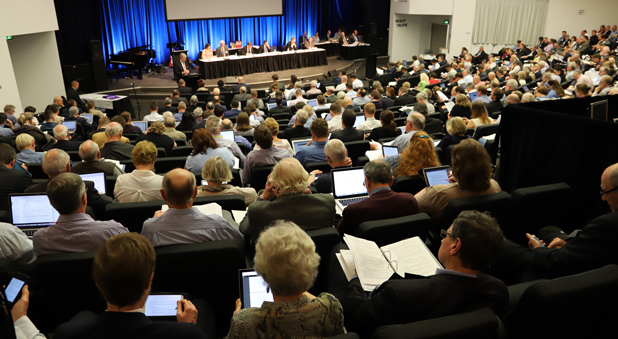A policy on responding to domestic abuse in churches has been passed overwhelmingly by Synod, following years of work by a Diocesan task force.
However, the chair of the taskforce, Canon Sandy Grant, has asked that it be passed provisionally, to allow for feedback on the policy, guidelines and resources from churches and abuse victims.
“It is just such a fraught area. So the very first guideline notes just how difficult this area is for pastors and others who respond to domestic abuse.” Canon Grant told the Synod. “But the guidelines are fairly detailed, with some repetition, since we’ve seen that clergy and church members have often been under-educated and naive; and on the other hand, sometimes over-confident in their insight or ability. But abuse can be hard to distinguish from regular conflict or dysfunction; and abusers can be very manipulative. So extra detail and reinforcement of good practice is needed.”
 Canon Grant praised the work of his deputy chair, Archdeacon Kara Hartley and the members of the task force.
Canon Grant praised the work of his deputy chair, Archdeacon Kara Hartley and the members of the task force.
Canon Grant said although the area was ‘complex’, he said it was “reductionistic to suggest any one factor is to blame: not worldview or religion, not gender, not drug or alcohol or psychology. But we are clear that domestic abuse always involves some misuse of power, and usually involves efforts to control others. And one case is one too many. “
The policy passed without dissent, and the Synod then moved on to the Implementation phase. Synod was asked to commend the Provisional Policy to all clergy and parish councils for use in churches, invite clergy and church members to provide comments and feedback request that the Standing Committee bring to the Synod session in 2018 proposed amendments to the Provisional Policy, and act on the recommendations of the report.
In addition, the Episcopal team was asked to determine a protocol for when clergy or lay ministers are either victims or perpetrators of domestic abuse.
Archdeacon Kara Hartley said the guidelines would be emailed to clergy and all parish councils, as well as being available from the PSU website.
 “We have discovered in our conversations with victims, as well as speaking with clergy and church workers, that leadership and congregations have at times been naïve, under-educated and under-resourced in this area. We have heard stories of how well perpetrators of domestic abuse have presented in public, ingratiating themselves with key members of church, including the minister and are often very deceptive and manipulative. We know there can be some misconceptions about abuse which may compromise care and support,” Archdeacon Hartley said. “So it’s not intended to be a document that sits in filing cabinets, on shelves, in draws or a folder deep within the complex virtual filing cabinet of your computer. This is a resource and we hope one you will use if and when sadly you encounter cases of domestic abuse in your church.”
“We have discovered in our conversations with victims, as well as speaking with clergy and church workers, that leadership and congregations have at times been naïve, under-educated and under-resourced in this area. We have heard stories of how well perpetrators of domestic abuse have presented in public, ingratiating themselves with key members of church, including the minister and are often very deceptive and manipulative. We know there can be some misconceptions about abuse which may compromise care and support,” Archdeacon Hartley said. “So it’s not intended to be a document that sits in filing cabinets, on shelves, in draws or a folder deep within the complex virtual filing cabinet of your computer. This is a resource and we hope one you will use if and when sadly you encounter cases of domestic abuse in your church.”
The seconder was lay member from Austinmeer, Mrs Glenda Devlin, who is also an Anglicare executive with post-graduate training in the area of domestic violence.
“The issues of domestic violence are complex, often because many behaviours are frequently unseen and victims have learnt to blame themselves. When people disclose domestic abuse there are usually no easy solutions and victims are often less safe when they try to make changes. Understandably, churches have often not known how to respond when people disclose domestic abuse.”
Anglicare has appointed a DV Advisor and Educator who will also be available to support to churches in the Diocese.
After the passage of the policy and implementation measures, Canon Grant proposed a motion expressing grief and apology in regards to domestic abuse.
We grieve with victims and survivors of domestic abuse, and pray for their healing and recovery. We give thanks to God for those women and men, clergy and lay people, who have faithfully supported, cared for and protected such victims in our churches and communities.
We grieve that God’s good gift of marriage can be distorted and dishonoured through the sin of perpetrators. We pray for their repentance and restoration to faithful living under Christ.
We also deeply regret that domestic abuse has occurred among those who attend our churches, and even among some in leadership. We apologise for those times our teaching and pastoral care have failed adequately to support victims and call perpetrators to account.
 “The actual apology in this paragraph is not for the abuse others committed. The perpetrators should apologise for that. Rather it apologises for those times our teaching or pastoral care has failed adequately to support victims and call perpetrators to account.” Canon Grant said. “One case is one too many. As a Synod, representing the local churches, I think we can share a corporate shame.”
“The actual apology in this paragraph is not for the abuse others committed. The perpetrators should apologise for that. Rather it apologises for those times our teaching or pastoral care has failed adequately to support victims and call perpetrators to account.” Canon Grant said. “One case is one too many. As a Synod, representing the local churches, I think we can share a corporate shame.”
In seconding the apology, the rector of Campbelltown, the Rev Nigel Fortescue said “it’s not just in the park in Campbelltown. It’s in homes. Domestic abuse is in the homes of our church members. Members of our church are caring for people right now because their Christian spouses are aggressive and violent towards them and their family. It’s a fact ... It's unacceptable. It's ungodly. And I need to do better at helping people. I am still learning how and I encourage you to encourage all your staff and growth group leaders to learn with me.”



























